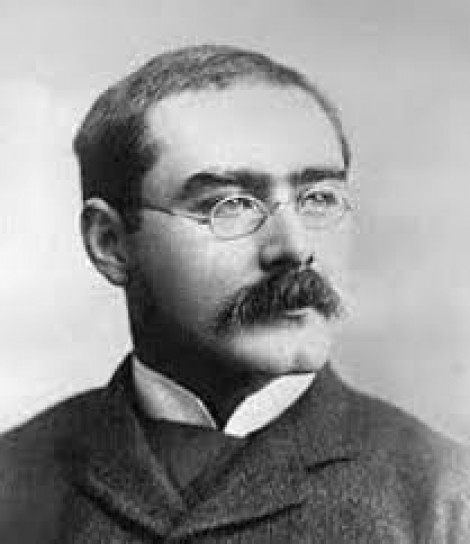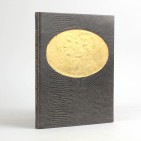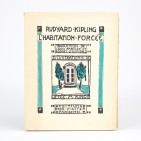KIPLING, Rudyard
"If history were taught in the form of stories, it would never be forgotten"
Joseph Rudyard Kipling was born in Bombay, India, but named after a lake in Staffordshire where his parents had met and fallen in love. This mixture of exotic far away lands and prosaic middle England is emblematic of the children born into the Empire at this time, and the duality is reflected in Kipling’s work. Sent back to England as a young boy, Kipling’s time at school was not a happy one, and he later recalled his unpleasant memories when he wrote Stalky & Co which, unlike the adventure stories for boys common at the time, shows children being bullies, vicious and frequently macabre. Having finished his education Kipling persuaded his father to allow him to return to India as a journalist for a small local paper in Lahore. In addition to his work for the paper, Kipling was also writing prolifically for himself, and his first collection of verse, Departmental Ditties was published in 1886, followed the next year by his first book of short stories Plain Tales From the Hills. Apparently unable to settle Kipling left India to travel and by 1892 he was married and living in Vermont. It was during that winter that thoughts of a boy being raised by wolves started to take shape:- “After blocking out the main idea in my head, the pen took charge, and I watched it begin to write stories about Mowgli and animals, which later grew into the two Jungle Books “ [Something of Myself] It took two years to finish, the first of the two books being published in 1894. This was a richly creative time for Kipling, during which he published numerous books of poetry, including Barrack Room Ballads (which contains some of the most popular of his poetry - Gunga Din and Mandalay) the novel Captains Courageous and further books of short stories. At the turn of the century he returned to England and started work on what many consider to be the finest of his Indian tales, Kim, and his ever popular self-illustrated book of animal fables the Just So Stories, published in 1901 and 1902 respectively. He continued to write until the 1930’s, his last book of short stories being Limits and Renewals, published in 1932.
Above all else, Kipling was a story teller, whether in verse or in prose, and this was recognized by the Swedish Academy in 1907 when they made him the first Englishman to win the Nobel Prize for literature, awarded "in consideration of the power of observation, originality of imagination, virility of ideas and remarkable talent for narration which characterize the creations of this world-famous author”
We regularly stock first editions and illustrated copies of Kipling's works - please scroll down to view.
Add to favourites








